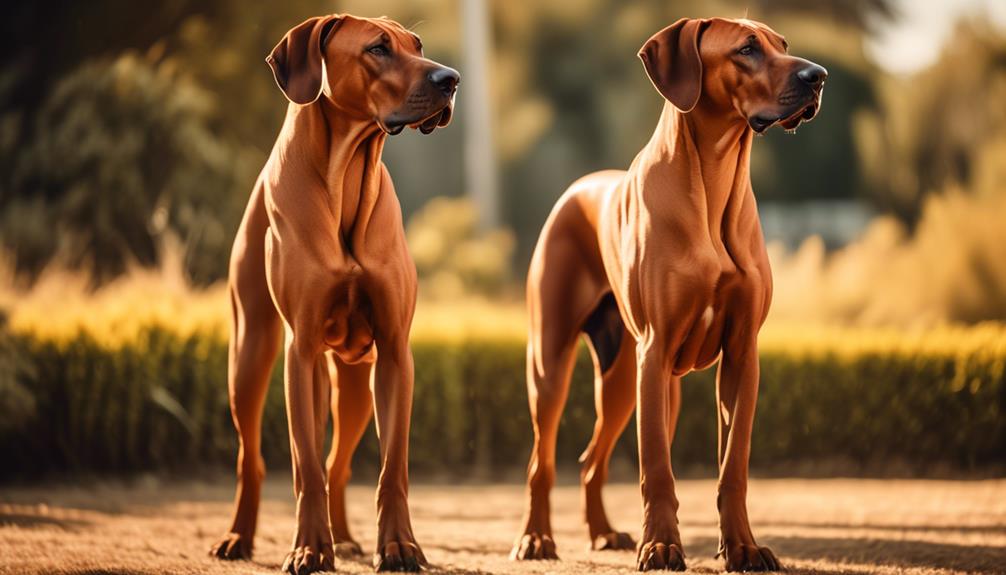
Are you ready to embark on a journey to uncover the fascinating world of the Rhodesian Ridgeback? This majestic breed, with its distinctive ridge of hair along its spine, is more than just a regal and protective companion.
In this discussion, we will delve into the origins, size, temperament, and exercise needs of this exceptional dog. But that’s not all – we will also explore their adaptability to apartment living, their friendliness, and their unique behavioral characteristics.
So, if you’re curious to learn more about this remarkable breed and discover if it’s the perfect fit for you, continue on and let the adventure begin.
Key Takeaways
- Rhodesian Ridgebacks are a versatile breed that can adapt well to apartment living, as long as they exhibit quiet and low-energy behavior towards neighbors.
- They are known for their loyalty and affection towards their families, making them excellent companions and emotional support animals.
- Rhodesian Ridgebacks have moderate exercise needs and require mental stimulation to prevent destructive behavior.
- Training a Rhodesian Ridgeback can be challenging, but with consistency, firmness, and fairness, they can achieve high-level training.
Origin and History
The Rhodesian Ridgeback, bred in Rhodesia (now Zimbabwe) for lion hunting, has a fascinating origin and history.
This breed was developed in Africa to hunt and corner big game prey, including lions. It has a mix of European hunting dogs and African dogs in its heritage. Originally used by the Boer farmers, the Rhodesian Ridgeback was later refined by big game hunter Cornelius van Rooyen. These dogs were prized for their ability to track, chase, and hold large prey until the hunter arrived.
Over time, they became known for their loyalty, strength, and endurance. Today, Rhodesian Ridgebacks can compete in various dog sports and make excellent hiking or jogging companions. Their history as fearless lion hunters adds to their unique appeal.
See another Dog breed profile.
Romanian Mioritic Shepherd Dog Breed
Size and Coat Characteristics
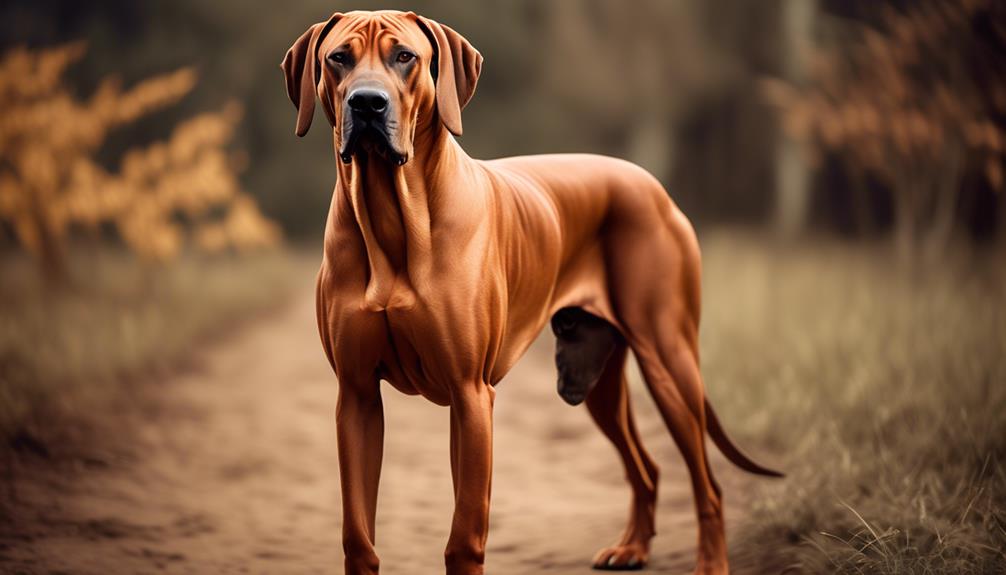
After learning about the fascinating origin and history of the Rhodesian Ridgeback, it’s time to explore the size and coat characteristics of this remarkable breed. Rhodesian Ridgebacks are a large breed, with adult males typically weighing between 85-90 pounds and adult females typically weighing between 70-75 pounds. They have a short and shiny coat that comes in various colors, ranging from light wheaten to red wheaten. Some Ridgebacks may also have black markings on the muzzle, ears, or around the eyes. To summarize the size and coat characteristics of the Rhodesian Ridgeback, refer to the table below:
| Size | Coat Characteristics |
|---|---|
| Adult Males: | 85-90 pounds |
| Adult Females: | 70-75 pounds |
| Coat: | Short and shiny |
| Colors: | Light wheaten to red wheaten, with possible black markings |
Temperament and Behavior
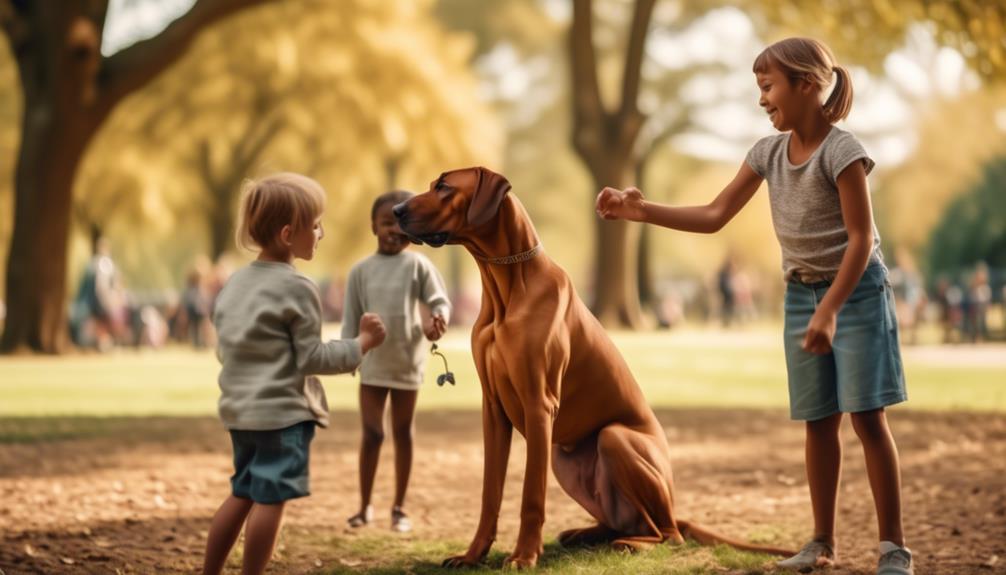
To understand the temperament and behavior of the Rhodesian Ridgeback, it’s important to delve into their unique characteristics and traits.
Rhodesian Ridgebacks are independent and intelligent dogs with a dignified and reserved nature towards strangers. They’re known to be quiet and gentle with their family, showing loyalty and affection. However, they can be too rambunctious for toddlers and are recommended for experienced owners due to their size, intelligence, and power.
Early socialization is essential for well-rounded behavior, and they require daily exercise and mental stimulation to prevent boredom and destructive behavior. Ridgebacks have a strong prey drive and must be kept on a leash in unfenced areas. Training should start early with firm and consistent methods.
Adaptability for Apartment Living
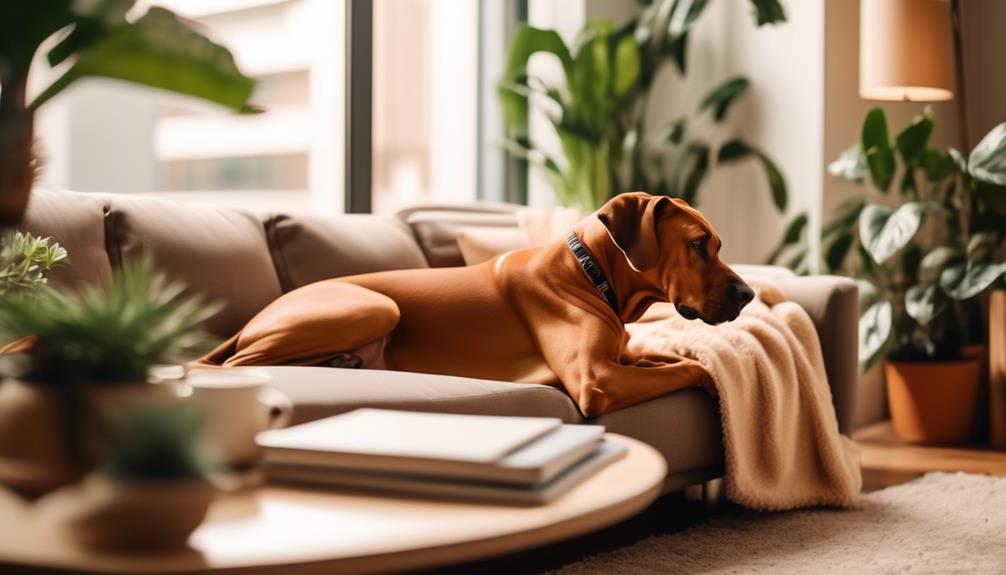
When considering the adaptability of the Rhodesian Ridgeback for apartment living, it’s important to take into account factors beyond their size. While the Ridgeback may be a large breed, they can actually adapt well to apartment living if certain conditions are met. Here are some things to consider:
- Quiet, low-energy, and polite behavior towards neighbors is important. Nobody wants to deal with constant barking or disruptive behavior.
- Small dogs with high energy levels may not be suitable for apartments. It’s important to choose a breed that matches the apartment lifestyle.
- Consider qualities such as being calm indoors and exhibiting good manners. A well-behaved dog will make apartment living much more enjoyable for everyone.
- Create a harmonious living environment for everyone involved. It’s important to consider the needs of both the dog and the neighbors to ensure a peaceful coexistence.
Exercise Needs and Behavioral Characteristics
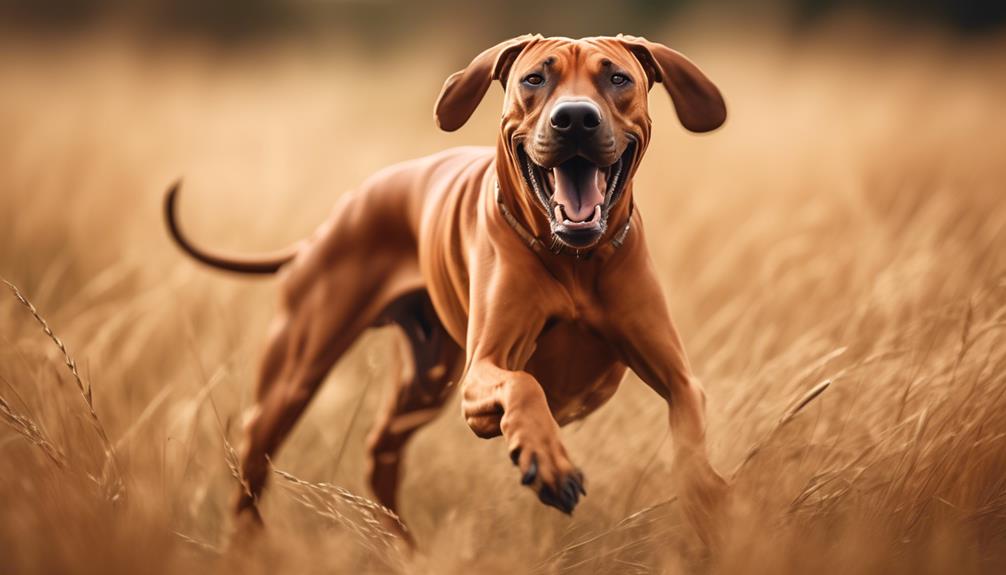
Exercising your Rhodesian Ridgeback and understanding their behavioral characteristics are key to ensuring their well-being and happiness. Rhodesian Ridgebacks have moderate exercise needs and require mental stimulation to prevent destructive behavior. They are a high-energy breed that thrives on daily exercise and vigorous activities. A lack of exercise can lead to boredom and behavioral issues. To meet their exercise needs, engaging activities such as hiking, jogging, or participating in dog sports are recommended. Mental stimulation through puzzle toys, training sessions, and interactive playtime is also important for their overall well-being. Additionally, it is crucial to understand their behavioral characteristics, such as their independent nature and strong prey drive. Proper training and early socialization are essential to help them become well-rounded and obedient companions.
| Exercise Needs | Behavioral Characteristics |
|---|---|
| Moderate exercise needs | Independent nature |
| Daily exercise and mental stimulation | Strong prey drive |
| Engaging activities like hiking, jogging, and dog sports | Training and socialization required |
| Mental stimulation through puzzle toys and interactive playtime | Obedient companions with proper training |
Health Information and Care
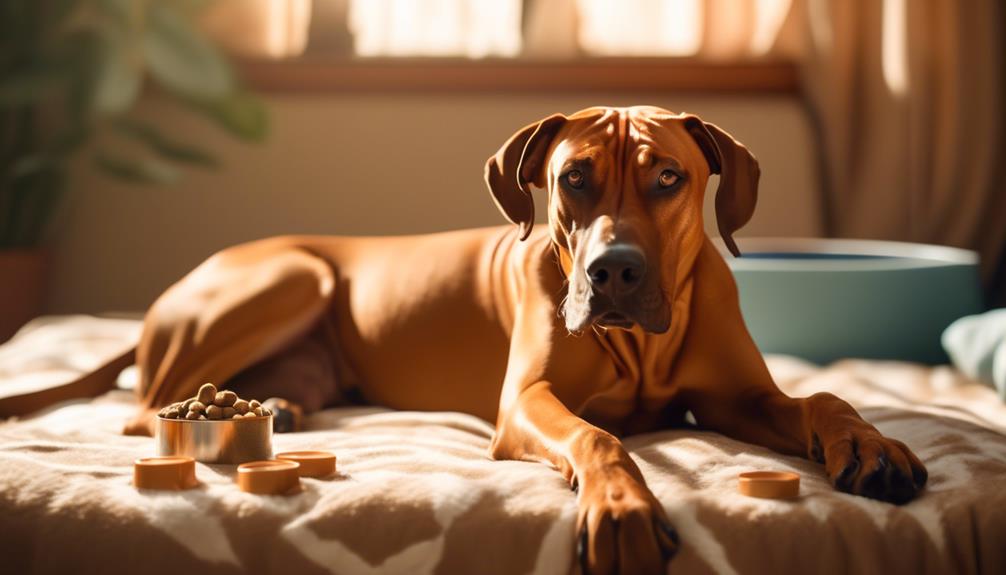
Taking care of your Rhodesian Ridgeback’s health is essential for their overall well-being and longevity. To ensure your beloved pet stays healthy and happy, consider the following:
Regular Veterinary Check-ups:
- Schedule routine visits to the veterinarian for vaccinations, preventive care, and health screenings.
- Early detection of any potential health issues can lead to prompt treatment and better outcomes.
Proper Nutrition and Exercise:
- Feed your Ridgeback a balanced diet of high-quality food to meet their nutritional needs.
- Provide regular exercise to keep them physically fit and mentally stimulated.
Grooming and Dental Care:
- Brush your Ridgeback’s coat regularly to maintain its shine and prevent matting.
- Take care of their dental hygiene by brushing their teeth and providing dental chews or treats.
Finding a Reputable Breeder or Rescue Group
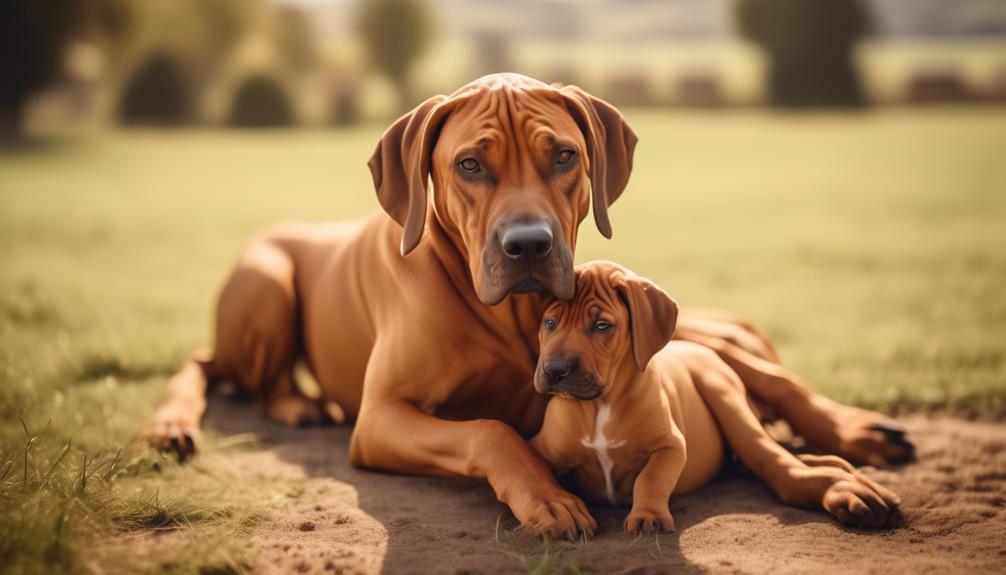
To ensure the well-being and future of your Rhodesian Ridgeback, it’s crucial to find a reputable breeder or rescue group.
When searching for a breeder, look for someone who prioritizes the health and socialization of their dogs. Reputable breeders will screen their breeding stock for any potential health problems and will provide you with a healthy and well-socialized puppy. Avoid backyard breeders who prioritize profit over the well-being of the dogs. Puppies from these breeders may have health and behavioral issues.
Alternatively, you may consider adopting an adult Rhodesian Ridgeback from a rescue group. These groups provide support and often have trained dogs available for adoption.
Whether you choose a breeder or a rescue group, make sure you do your research and find a reputable source to ensure the best future for your Rhodesian Ridgeback.
Frequently Asked Questions
Are Rhodesian Ridgebacks Good With Children?
Rhodesian Ridgebacks are generally good with children, but they can be too energetic for toddlers. Teach kids how to approach and interact with them, and always supervise their interactions.
Do Rhodesian Ridgebacks Require a Lot of Grooming?
No, Rhodesian Ridgebacks don’t require a lot of grooming. Their short and shiny coat only requires regular brushing to keep it looking nice. They are a low-maintenance breed in terms of grooming.
Can Rhodesian Ridgebacks Live in Hot Climates?
Yes, Rhodesian Ridgebacks can live in hot climates. They have short, shiny coats that help them adapt to warmer weather. However, it’s important to provide them with plenty of shade, water, and avoid excessive exercise during the hottest parts of the day.
Are Rhodesian Ridgebacks Prone to Separation Anxiety?
No, Rhodesian Ridgebacks are not prone to separation anxiety. However, like any dog, they can develop separation anxiety if not properly trained and socialized. It is important to provide them with mental stimulation and gradually increase their alone time.
How Much Do Rhodesian Ridgebacks Typically Cost?
Rhodesian Ridgebacks typically cost between $1,200 and $2,500. Prices can vary depending on factors such as the breeder’s reputation, the dog’s pedigree, and the location.
Conclusion
In conclusion, the Rhodesian Ridgeback is a majestic and loyal companion, perfect for experienced owners seeking a devoted and intelligent partner. With their dignified nature and unique ridge of hair, they stand out in both appearance and temperament.
While they may not be the best fit for apartment living, their exercise needs and behavioral characteristics make them an excellent choice for those with an active lifestyle. With proper training and care, the Rhodesian Ridgeback can bring joy and protection to any home.




